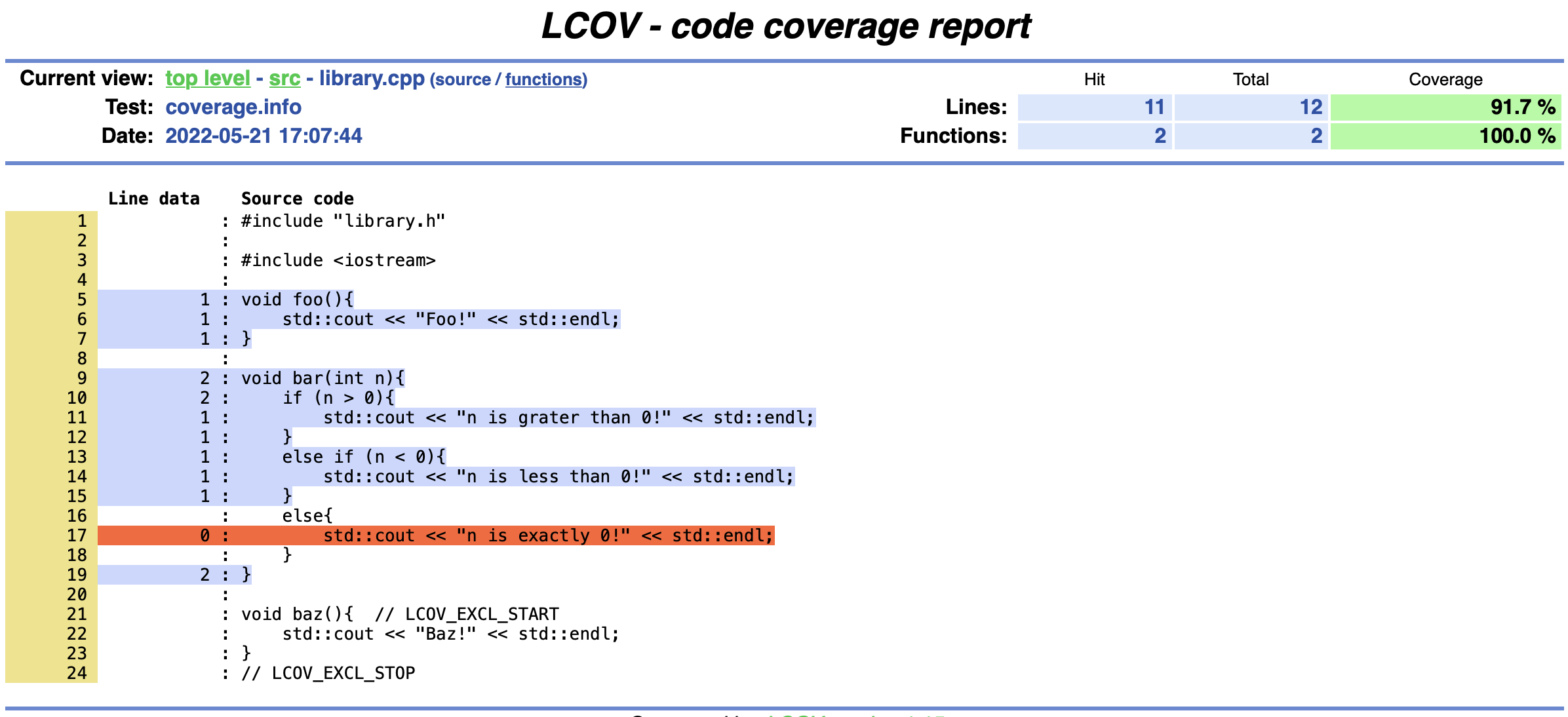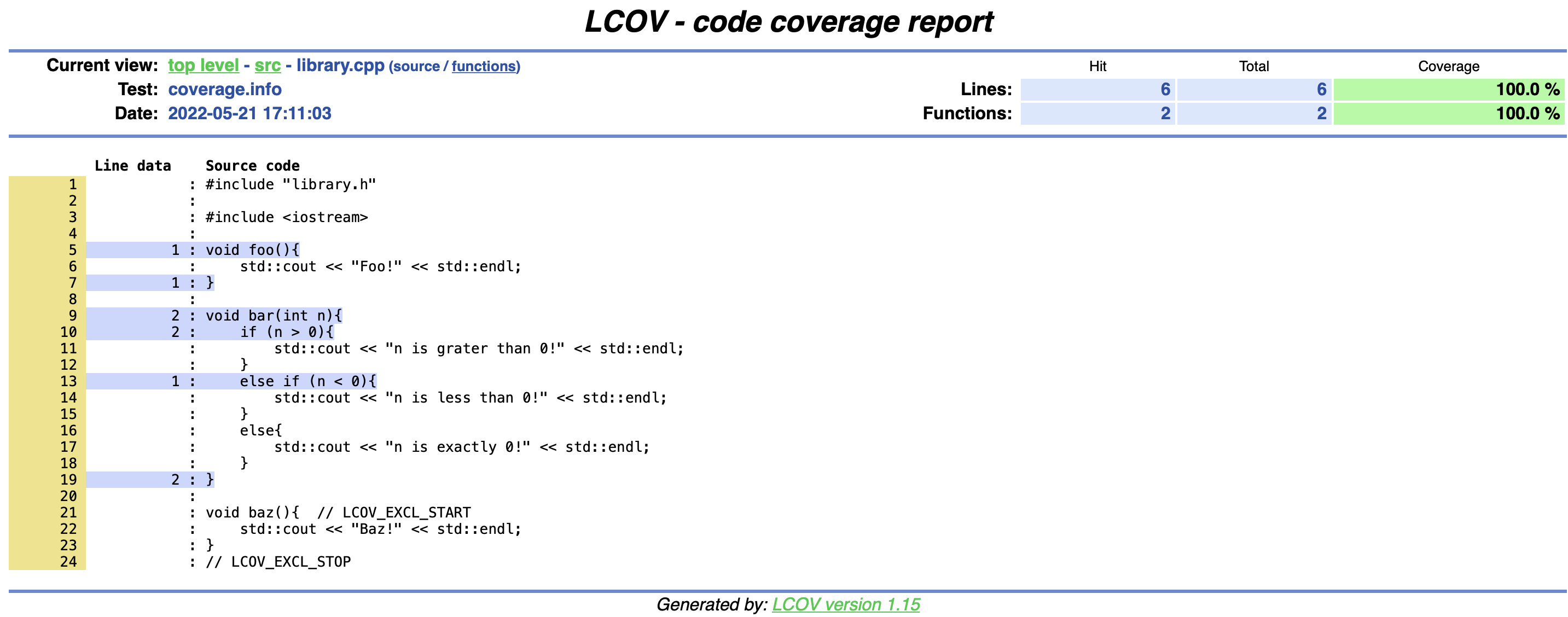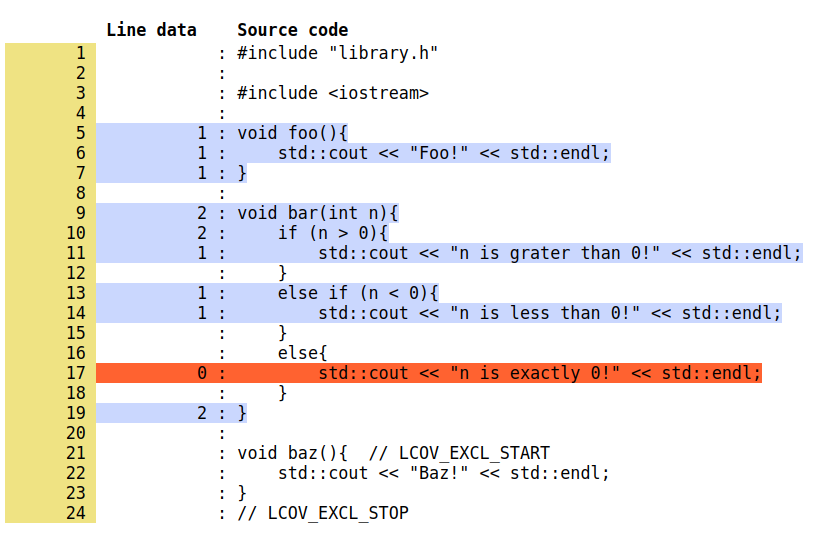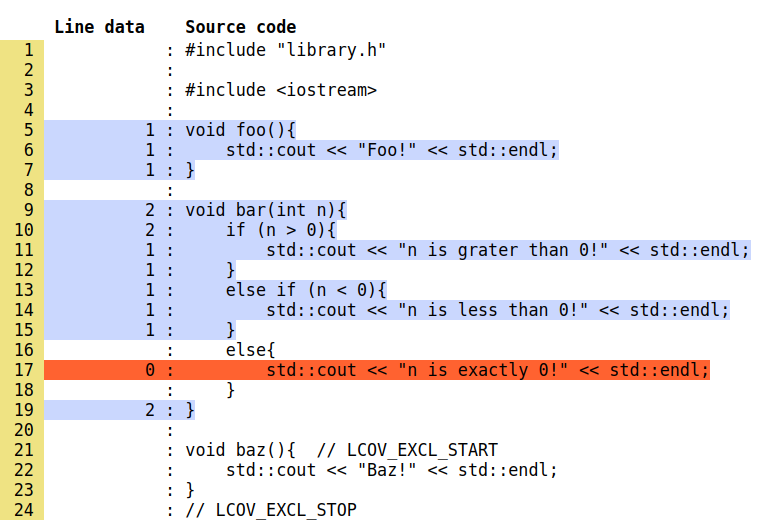I'm trying to understand how to properly structure a C++ project by using CMake, googletest, and gcov for test coverage. I would like to build a general CMakeLists.txt that would work for any platform/compiler.
This is my first attempt. However, if I try to build the project and then run lcov (to generate the report), I see that I have different results if I use CLang (right result) or GCC (wrong result).
Note that I'm on MacOs and I installed gcc through brew (brew install gcc).
Moreover I used the following flags in my main CMakeLists.txt:
if(CODE_COVERAGE)
SET(CMAKE_CXX_FLAGS "${CMAKE_CXX_FLAGS} -fprofile-arcs -ftest-coverage" )
endif()
Note: If you find something wrong/weird in my CMakeLists.txt files or lcov usage, I'm open to any kind of feedback!
My library
#include "library.h"
#include <iostream>
void foo(){
std::cout << "Foo!" << std::endl;
}
void bar(int n){
if (n > 0){
std::cout << "n is grater than 0!" << std::endl;
}
else if (n < 0){
std::cout << "n is less than 0!" << std::endl;
}
else{
std::cout << "n is exactly 0!" << std::endl;
}
}
void baz(){ // LCOV_EXCL_START
std::cout << "Baz!" << std::endl;
}
// LCOV_EXCL_STOP
My tests
#ifndef GCOV_TUTORIAL_TEST_LIBRARY_H
#define GCOV_TUTORIAL_TEST_LIBRARY_H
#include "../src/library.h"
#include <gtest/gtest.h>
namespace gcov_tutorial::tests {
TEST(TestFooSuite,TestFoo){
foo();
}
TEST(TestBarSuite,TestBarGreaterThanZero){
bar(100);
}
TEST(TestBarSuite,TestBarEqualToZero){
//bar(0);
}
TEST(TestBarSuite,TestBarLessThanZero){
bar(-100);
}
}
#endif //GCOV_TUTORIAL_TEST_LIBRARY_H
CLang Compilation
#!/bin/bash
# Rationale: https://vaneyckt.io/posts/safer_bash_scripts_with_set_euxo_pipefail/
set -euxo pipefail
# BASE_DIR is the project's directory, containing the src/ and tests/ folders.
BASE_DIR=$PWD
COVERAGE_FILE=coverage.info
GCOV_PATH=/usr/bin/gcov
CLANG_PATH=/usr/bin/clang
CLANGPP_PATH=/usr/bin/clang++
rm -rf build
mkdir build && cd build
# Configure
cmake -DCMAKE_C_COMPILER=$CLANG_PATH -DCMAKE_CXX_COMPILER=$CLANGPP_PATH -DCODE_COVERAGE=ON -DCMAKE_BUILD_TYPE=Release ..
# Build (for Make on Unix equivalent to `make -j $(nproc)`)
cmake --build . --config Release
# Clean-up for any previous run.
rm -f $COVERAGE_FILE
lcov --zerocounters --directory .
# Run tests
./tests/RunTests
# Create coverage report by taking into account only the files contained in src/
lcov --capture --directory tests/ -o $COVERAGE_FILE --include "$BASE_DIR/src/*" --gcov-tool $GCOV_PATH
# Create HTML report in the out/ directory
genhtml $COVERAGE_FILE --output-directory out
# Show coverage report to the terminal
lcov --list $COVERAGE_FILE
# Open HTML
open out/index.html
GCC Compilation
#!/bin/bash
# Rationale: https://vaneyckt.io/posts/safer_bash_scripts_with_set_euxo_pipefail/
set -euxo pipefail
# BASE_DIR is the project's directory, containing the src/ and tests/ folders.
BASE_DIR=$PWD
COVERAGE_FILE=coverage.info
GCOV_PATH=/usr/local/bin/gcov-11
GCC_PATH=/usr/local/bin/gcc-11
GPP_PATH=/usr/local/bin/g++-11
rm -rf build
mkdir build && cd build
# Configure
cmake -DCMAKE_C_COMPILER=$GCC_PATH -DCMAKE_CXX_COMPILER=$GPP_PATH -DCODE_COVERAGE=ON -DCMAKE_BUILD_TYPE=Release ..
# Build (for Make on Unix equivalent to `make -j $(nproc)`)
cmake --build . --config Release
# Clean-up for any previous run.
rm -f $COVERAGE_FILE
lcov --zerocounters --directory .
# Run tests
./tests/RunTests
# Create coverage report by taking into account only the files contained in src/
lcov --capture --directory tests/ -o $COVERAGE_FILE --include "$BASE_DIR/src/*" --gcov-tool $GCOV_PATH
# Create HTML report in the out/ directory
genhtml $COVERAGE_FILE --output-directory out
# Show coverage report to the terminal
lcov --list $COVERAGE_FILE
# Open HTML
open out/index.html




